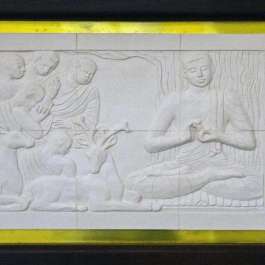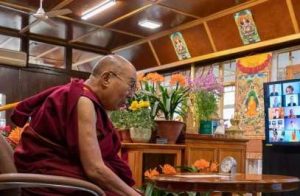
Prominent Burmese human rights lawyer and pro-democracy activist U Nay Min has died of COVID-19 in the former capital Yangon. He passed on 16 July at the age of 75. Myanmar is facing its largest wave of COVID-19 infections, a major health crisis that has been compounded by anti-government protests across the nation following the 2 February military coup.
Based in Yangon, U Nay Min was one of the leaders behind the student-led anti-government protests known as the 8888 Uprising, which began on 8 August 1988.
Chris Gunness, director of the London-based Myanmar Accountability Project, worked closely with U Nay Min throughout the revolution. He writes of the moment that the revolution began: “U Nay Min was the mastermind of this seminal ‘big bang’ moment, which resonates loudly today as the Civil Disobedience Movement again braves military repression on the streets.” (The Irrawaddy)
U Nay Min also worked as a “ringer,” a source of information for Gunness, who was a BBC journalist in Mynamar at the time. After the uprising, U Nay Min was imprisoned for eight years, much of it in solitary confinement. Folowing his release, he was rearrested and imprisoned for a further eight years.
Gunness writes that he visited U Nay Min in 2013—more than two years after Myanmar began opening up with the release of Ang San Suu Kyi in 2010. U Nay Min was a lay Buddhist, confessing to Gunness that his long prison sentences meant that he must have been a bad person in a previous life.
However, as an exemplar of the Buddhist virtue of seeking to help all beings, U Nay Min devoted much of his life to defending Myanmar’s minorities, in particular the country’s Muslim population. In 2014, U Nay Min was honored by a panel of journalists at the 2014 East-West Center International Media Conference, held in Yangon. The event featured Aung San Suu Kyi as a headline speaker.

Veteran journalist Bertil Lintner, one of the three journalists who honored U Nay Min, felt that the Burmese people who helped get information out to journalists at that time should be remembered. “We would not have been able to do our job without their support,” Lintner said. “U Nay Min was the one who had to suffer the most because of the job he did, therefore we wanted to honor him and the work he did.” (The Irrawaddy)

In 2018, the correspondence of U Nay Min and Chris Gunness, and the events of 1988, were featured in a play in London called Eastern Star, after the codename that U Nay Min used following the breakdown of security in Myanmar when Gunness was forced to flee the country.
U Nay Min was diagnosed with COVID-19 in early July. Despite efforts by Gunness and others to secure him an oxygen tank, he passed away overnight, possibly due to a fault in the oxygen tank’s valve.
"U Nay Min, an unsung hero of Myanmar’s pro-democracy uprising in 1988, died of COVID-19 at the age of 75 on Friday night. He served as an unofficial stringer supplying information about the protests and government crackdowns in 1988 to" the BBC. https://t.co/UZzkLzbI3N pic.twitter.com/NgUQYd7Jo1
— Kenneth Roth (@KenRoth) July 18, 2021
Gunness concludes his eulogy of U Nay Min:
Rest in peace, U Nay Min. Yours was a life of sacrifice, lived for others. May your foresight, courage and commitment never be forgotten, particularly in Myanmar, a country whose fate you shaped and where your legacy lives on in Generation Z.
Eastern Star may have been extinguished, but your light still shines and always will. (The Irrawaddy)
U Nay Min’s passing comes as new deaths overwhelm medical services in Myanmar. The World Health Organization has documented a dramatic surge beginning in early July, reaching a peak of 7,083 new daily cases on 14 July. As of this writing, the total number of confirmed cases of COVID-19 in Myanmar is 234,710 with 5,281 deaths. As of the latest figures in early June, some 3,368,042 vaccine doses have been administered throughout the country of more than 54 million people.

Follwing the military coup in February, many hospitals are empty of pro-democracy medical staff, who have been on strike since military forces fired on ambulances and into hospitals treating wounded protesters. Leading health officials, including some in charge of the nation’s vaccination program, have been detained by the military. As a result, volunteers have stepped in to bring oxygen to the sick and to help remove dead bodies from homes.
Sann Oo, who began working as a volunteer in 2020, said: “We used to send patients to hospitals. We asked patients ‘which hospital do you wanna go to?’ But now it’s different. When we receive incoming calls, we have to ask, ‘Which cemetery?’” (AFP)
The volunteers take on the roles of not only medical staff but also of Buddhist monks, as they offer impromptu Buddhist funeral rites.
See more
Obituary: Unacknowledged Godfather of Myanmar’s Democracy Movement Dies of COVID-19 (The Irrawaddy)
An Unsung ’88 Hero Gets His Due (The Irrawaddy)
Aung San Suu Kyi: Greater Press Freedom Means Greater Responsibility (Archive)
Eastern Star review – heroism and journalism in heart of Burmese revolution (The Guardian)
‘Dead body carrier’: Covid surge overwhelms Myanmar burial volunteers (AFP)
Related news from Buddhistdoor Global
UPDATE: Socially Engaged Buddhist Groups Deliver Medical Relief to Pro-democracy Protestors in Myanmar
INEB, Clear View Project Launch Humanitarian Appeal for Buddhist Monastics in Myanmar
Pro-democracy Protesters Hold Silent Strikes During Myanmar’s Buddhist New Year Holiday
Buddhist Monks March in Opposition to Military Coup in Myanmar
UPDATE: INEB Calls for Reconciliation in Myanmar as Pro-democracy Protests Turn Violent
Peace Sangha Union Issues Statement on Myanmar Coup as Buddhist Monks Join Pro-democracy Protests
Fugitive Nationalist Buddhist Monk Surrenders to Police in Myanmar Ahead of Poll
Rohingya Refugees Raise Funds to Help Displaced Buddhists in Myanmar’s Rakhine State
Related features from Buddhistdoor Global
Myanmar: A Month into the Coup
A Reflection on the Intellectual and Socio-Cultural History of Buddhism in Myanmar
The Other Shoe Drops: Reflections on Myanmar’s Latest Coup
Sea of Suffering: The Rohingya and the Conundrum of Buddhist Terror
Buddhistdoor View: Reconciling Nationalism and Buddhism












